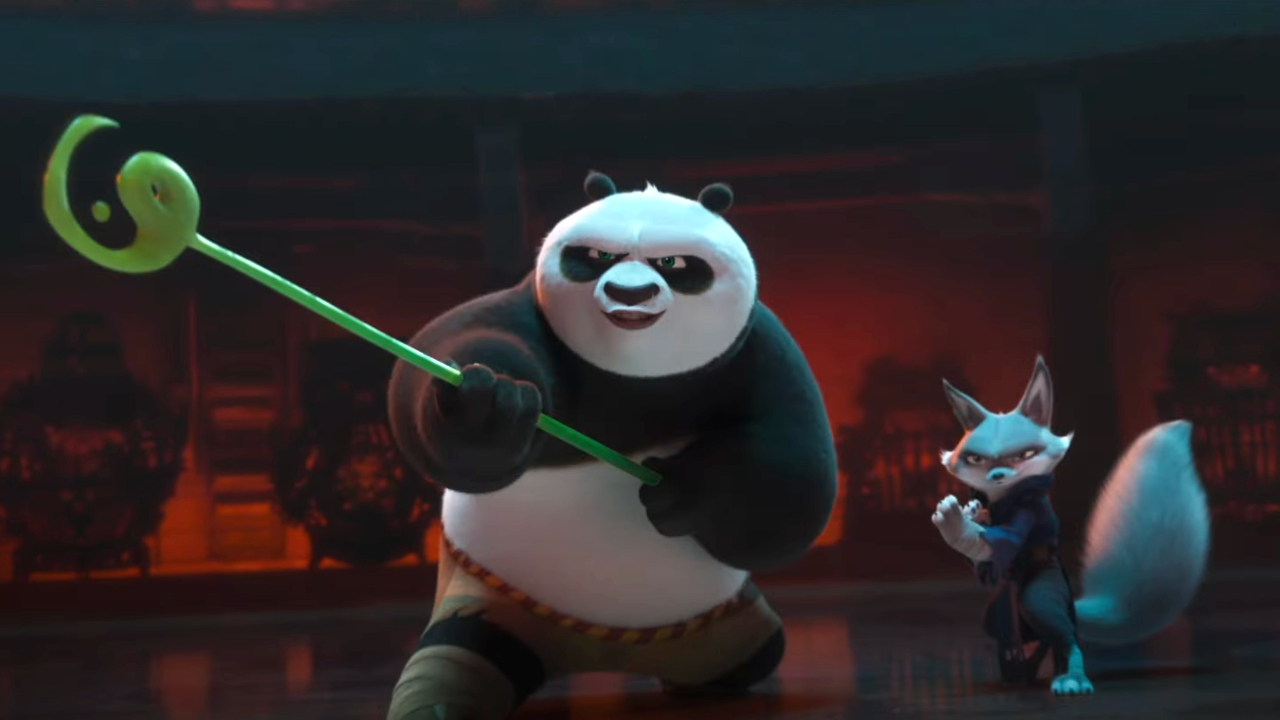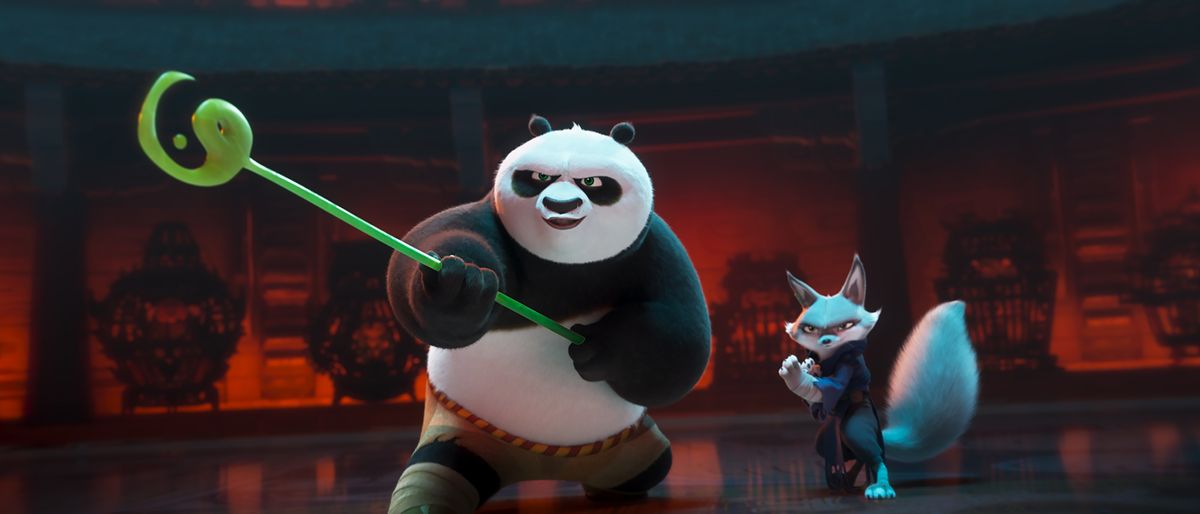The reason why trilogies are franchise staples in film isn’t complicated. Classic story structure plays out in three acts – beginning, middle, and end – and while each individual chapter of a trilogy is designed to feature its own independent narrative, the ultimate goal is to weave a macro through line that showcases growth in the protagonists. Because of this, fourth chapters can provide a sink-or-swim moment: with the first arc completed, it’s the time when it’s shown whether or not there is truly more story to tell.
Kung Fu Panda 4

Release Date: March 8, 2024
Directed By: Mike Mitchell and Stephanie Ma Stine
Written By: Jonathan Aibel & Glenn Berger and Darren Lemke
Starring: Jack Black, Awkwafina, Viola Davis, Dustin Hoffman, James Hong, Bryan Cranston, Ian McShane, and Ke Huy Quan
Rating: PG for martial arts action/mild violence, scary images and some mild rude humor
Runtime: 94 minutes
That’s where we’re now at with the Kung Fu Panda movies. Between 2008 and 2016, audiences witnessed the evolution and maturity of Po (Jack Black) – who goes from being a lazy and gluttonous dreamer to being a great hero who is ready to pass on what he has learned. As the end of a trilogy, Kung Fu Panda 3 is a movie that provides resolution, as Po not only becomes a leader as the heralded Dragon Warrior, but finds answers to the mysteries of his past when he begins a relationship with his biological father.
Nearly a decade later, we now have Mike Mitchell and Stephanie Ma Stine’s Kung Fu Panda 4 – a new sequel that opts to take on the challenge of opening a closed door and ends up struggling in the effort. While it’s not bad or even unwelcome, but to paraphrase Gertrude Stein, there isn’t much there there. The effort very much feels stripped down, with Furious Five members Angelina Jolie, Seth Rogen, Lucy Liu, David Cross, and Jackie Chan all sitting this chapter out, and lessons and development from the previous movie are rehashed in a new mold. It’s cute and peppered with funny moments, and the excellent style and animation perpetuate the series’ established and demonstrated love for martial arts cinema, but it’s also the least substantive feature in the franchise.
Written by franchise stalwarts Jonathan Aibel and Glenn Berger and newcomer Darren Lemke, Kung Fu Panda 4 begins with Po very much settled into his role as the Dragon Warrior of the Valley of Peace. While the members of the Furious Five are all off on their own individual missions (a very quick rundown is provided about their whereabouts), the black-and-white bear spends his days locally kicking butt when called upon and doing publicity events like restaurant openings. He’s become beyond comfortable… and that’s when Master Shifu (Dustin Hoffman) comes in with a bombshell: the time has come to pick his successor.
Despite all of the progress that Po made as both a leader and a teacher in the previous movie, he is reticent to choose the hero who will be selected as the next Dragon Warrior, and he instead embraces the distraction of a new adventure. When a burgling fox names Zhen (Awkwafina) attempts to raid the Jade Palace, he learns from her that a new evil is on the rise named The Chameleon (Viola Davis), a sorceress with the ability to change her form at will who has aspirations of world domination. Shifu protests, but Po and Zhen head off to the distant Juniper City to find the new villain, the hero not fully prepared for what kind of surprises and danger await.
Kung Fu Panda 4 never really finds a way to justify the continuation of this series.
There is a stated determination from Po in Kung Fu Panda 4 to keep things the way they were, and while that’s part of the protagonist learning about the value of change over the course of the film, it also aptly describes the movie’s creative stifling and how the story fits into the established canon. The new sequel can’t be said to betray what came before it in the previous films, but there is enough backtracking and treading water to make the journey less satisfying, and there are too many predictable elements in the journey with Po and Zhen to make it excusable (you can probably tell where things are going with the duo based on the plot description above).
This is true even beyond Po. With just about all of the other established side characters left out of the picture, the film opts to have its B-plot center on Po’s two fathers Mr. Ping (James Hong) and Li (Bryan Cranston), who chase after their son fearing for his life… despite their full awareness of Po’s talents, strengths and history battling evil. The duo makes a cute pair, and there is fun and humor to be found in their story, but it also very much feels like barrel-scrapping narratively, and it adds nothing thematically to the adventure. It feels like the result of a conversation that started with, “What do we have?” instead of “Wouldn’t it be cool if…”
Featuring plenty of fun and action, Kung Fun Panda 4 gets MVP performances from Viola Davis and Ke Huy Quan.
Elevating the weakest entry in the Kung Fu Panda series is its antagonist and the darker comedic sensibilities in play when the characters arrive in Juniper City. The larger objective of The Chameleon is disappointingly thin, but her means to achieving that goal are exciting and her ability to transform is well-used both dramatically and in action. Viola Davis injects the character with power and presence despite her small stature in her natural state, and the animators deliver some thrilling work in her big final showdown with Po.
The action is solid on the whole, and while not every joke lands, it successfully inspires some big laughs. Demonstrating an effort for the series to mature a bit with its original audience, the movie works a sinister sense of humor into the mix with Po and Zhen making a journey into the criminal underworld of Juniper City, and it’s a land of cute-but-vicious bunnies and denizens who effortlessly discover calls to violence in delivered messages of peace and wisdom. Ke Huy Quan does some terrific work as a crime boss pangolin named Han, with the only criticism being that the film doesn’t feature more of the character.
There is enough to like in Kung Fu Panda 4 to make it enjoyable… but it’s also enough to make it disappointing that so much of the film feels like a straight effort for Dreamworks Animation to simply bank on recognizable IP. If this is a test to see if there’s enough gas left in the tank to inspire a whole new trilogy of Kung Fu Panda movies, the answer is no.
